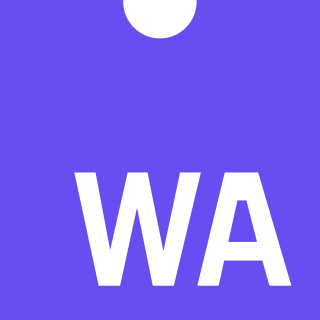In computing, a virtual machine (VM) is the virtualization or emulation of a computer system. Virtual machines are based on computer architectures and provide the functionality of a physical computer. Their implementations may involve specialized hardware, software, or a combination of the two. Virtual machines differ and are organized by their function, shown here:
SuperCollider is an environment and programming language originally released in 1996 by James McCartney for real-time audio synthesis and algorithmic composition.

Live coding, sometimes referred to as on-the-fly programming, just in time programming and conversational programming, makes programming an integral part of the running program.
The actor model in computer science is a mathematical model of concurrent computation that treats an actor as the basic building block of concurrent computation. In response to a message it receives, an actor can: make local decisions, create more actors, send more messages, and determine how to respond to the next message received. Actors may modify their own private state, but can only affect each other indirectly through messaging.

Racket is a general-purpose, multi-paradigm programming language and a multi-platform distribution that includes the Racket language, compiler, large standard library, IDE, development tools, and a set of additional languages including Typed Racket, Swindle, FrTime, Lazy Racket, R5RS & R6RS Scheme, Scribble, Datalog, Racklog, Algol 60 and several teaching languages.
Chez Scheme is a programming language, a dialect and implementation of the language Scheme which is a type of Lisp. It uses an incremental native-code compiler to produce native binary files for the x86, PowerPC, and SPARC processor architectures. It has supported the R6RS standard since version 7.9.1. It is free and open-source software released under an Apache License, version 2.0. It was first released in 1985, by R. Kent Dybvig, originally licensed as proprietary software, and then released as open-source software on GitHub on 2016-05-13 with version 9.4.
QuickCheck is a software library, specifically a combinator library, originally written in the programming language Haskell, designed to assist in software testing by generating test cases for test suites – an approach known as property testing.
R. Kent Dybvig is a professor emeritus of computer science at Indiana University Bloomington, in Bloomington, Indiana. His research focuses on programming languages, and he is the principal developer of the optimizing Chez Scheme compiler and runtime system which were initially released in 1985. Together with Daniel P. Friedman, he has long advocated the use of the Scheme language in teaching computer science. He retired from Indiana University to join Cisco in 2011.

Geany is a free and open-source lightweight GUI text editor using Scintilla and GTK, including basic IDE features. It is designed to have short load times, with limited dependency on separate packages or external libraries on Linux. It has been ported to a wide range of operating systems, such as BSD, Linux, macOS, Solaris and Windows. The Windows port lacks an embedded terminal window; also missing from the Windows version are the external development tools present under Unix, unless installed separately by the user. Among the supported programming languages and markup languages are C, C++, C#, Java, JavaScript, PHP, HTML, LaTeX, CSS, Python, Perl, Ruby, Pascal, Haskell, Erlang, Vala and many others.

A robotics simulator is a simulator used to create an application for a physical robot without depending on the physical machine, thus saving cost and time. In some case, such applications can be transferred onto a physical robot without modification.

Impromptu is a Mac OS X programming environment for live coding. Impromptu is built around the Scheme language, which is a member of the Lisp family of languages. The source code of its core has been opened as the Extempore project.
Haskell is a general-purpose, statically-typed, purely functional programming language with type inference and lazy evaluation. Designed for teaching, research, and industrial applications, Haskell has pioneered a number of programming language features such as type classes, which enable type-safe operator overloading, and monadic input/output (IO). It is named after logician Haskell Curry. Haskell's main implementation is the Glasgow Haskell Compiler (GHC).
The following tables provide a comparison of linear algebra software libraries, either specialized or general purpose libraries with significant linear algebra coverage.
Probabilistic programming (PP) is a programming paradigm in which probabilistic models are specified and inference for these models is performed automatically. It represents an attempt to unify probabilistic modeling and traditional general purpose programming in order to make the former easier and more widely applicable. It can be used to create systems that help make decisions in the face of uncertainty.
Gradual typing is a type system in which some variables and expressions may be given types and the correctness of the typing is checked at compile time and some expressions may be left untyped and eventual type errors are reported at runtime. Gradual typing allows software developers to choose either type paradigm as appropriate, from within a single language. In many cases gradual typing is added to an existing dynamic language, creating a derived language allowing but not requiring static typing to be used. In some cases a language uses gradual typing from the start.

RIOT is a small operating system for networked, memory-constrained systems with a focus on low-power wireless Internet of things (IoT) devices. It is open-source software, released under the GNU Lesser General Public License (LGPL).

WebAssembly defines a portable binary-code format and a corresponding text format for executable programs as well as software interfaces for facilitating interactions between such programs and their host environment.

Project Jupyter is a project to develop open-source software, open standards, and services for interactive computing across multiple programming languages. It was spun off from IPython in 2014 by Fernando Pérez and Brian Granger. Project Jupyter's name is a reference to the three core programming languages supported by Jupyter, which are Julia, Python and R. Its name and logo are an homage to Galileo's discovery of the moons of Jupiter, as documented in notebooks attributed to Galileo. Project Jupyter has developed and supported the interactive computing products Jupyter Notebook, JupyterHub, and JupyterLab. Jupyter is financially sponsored by NumFOCUS.









